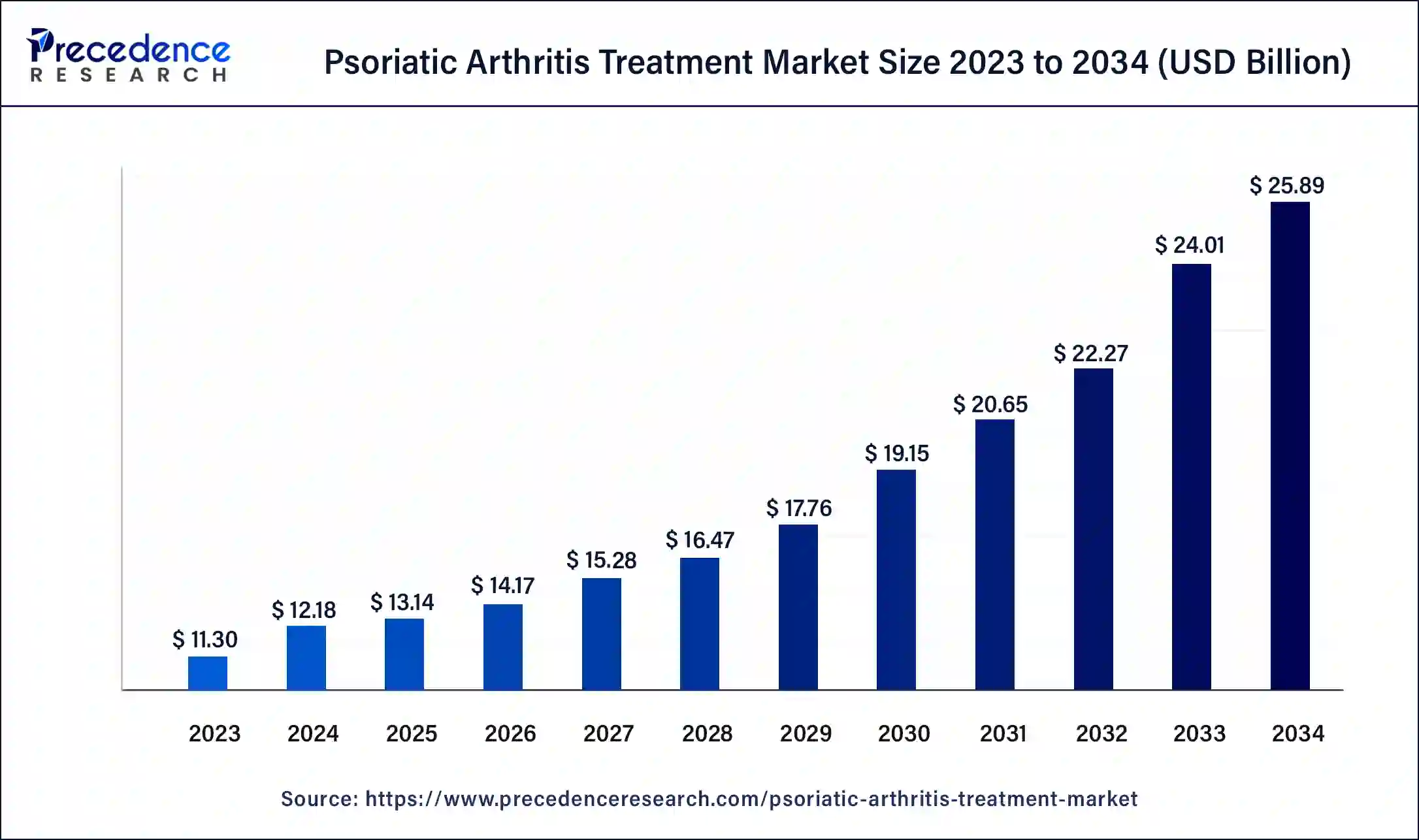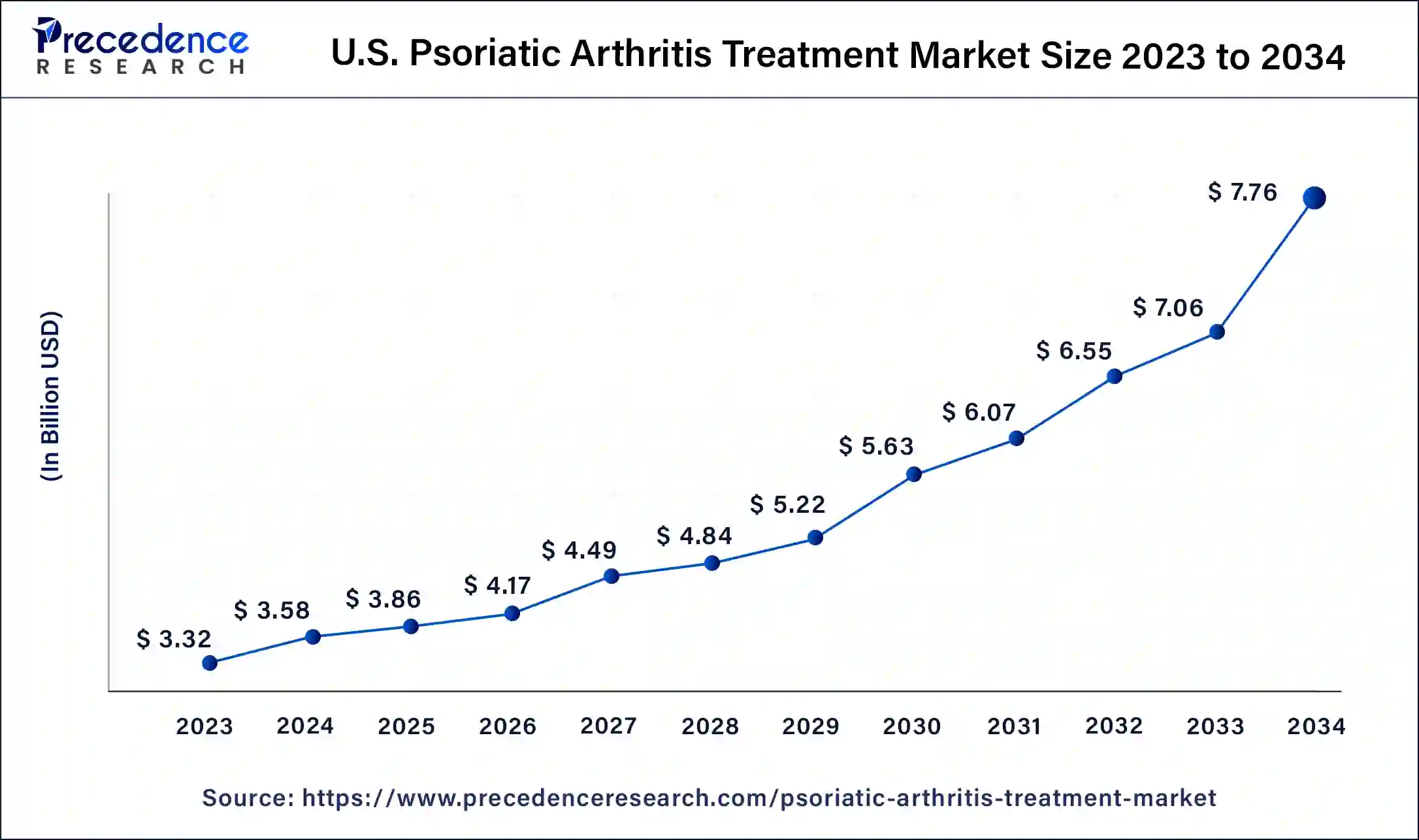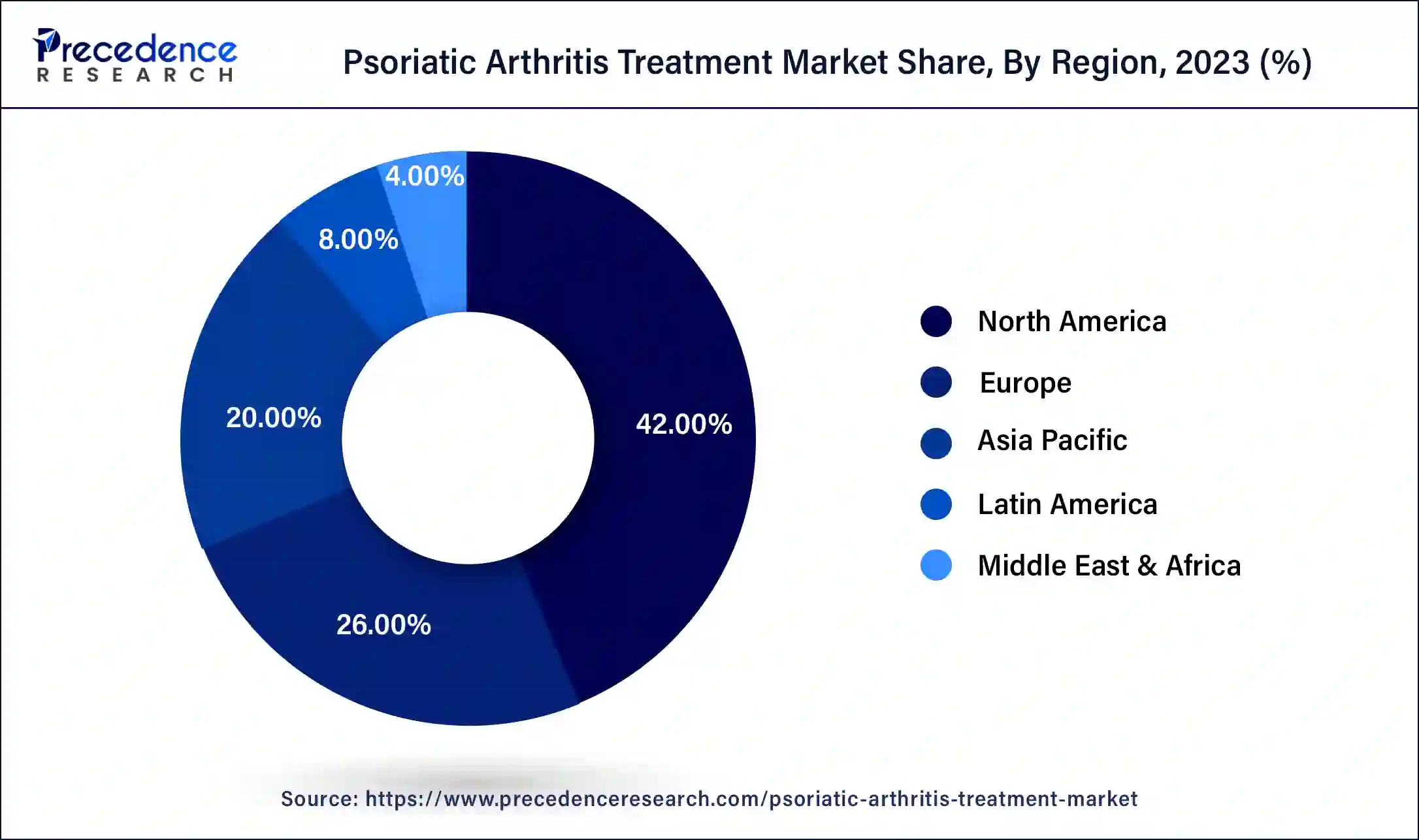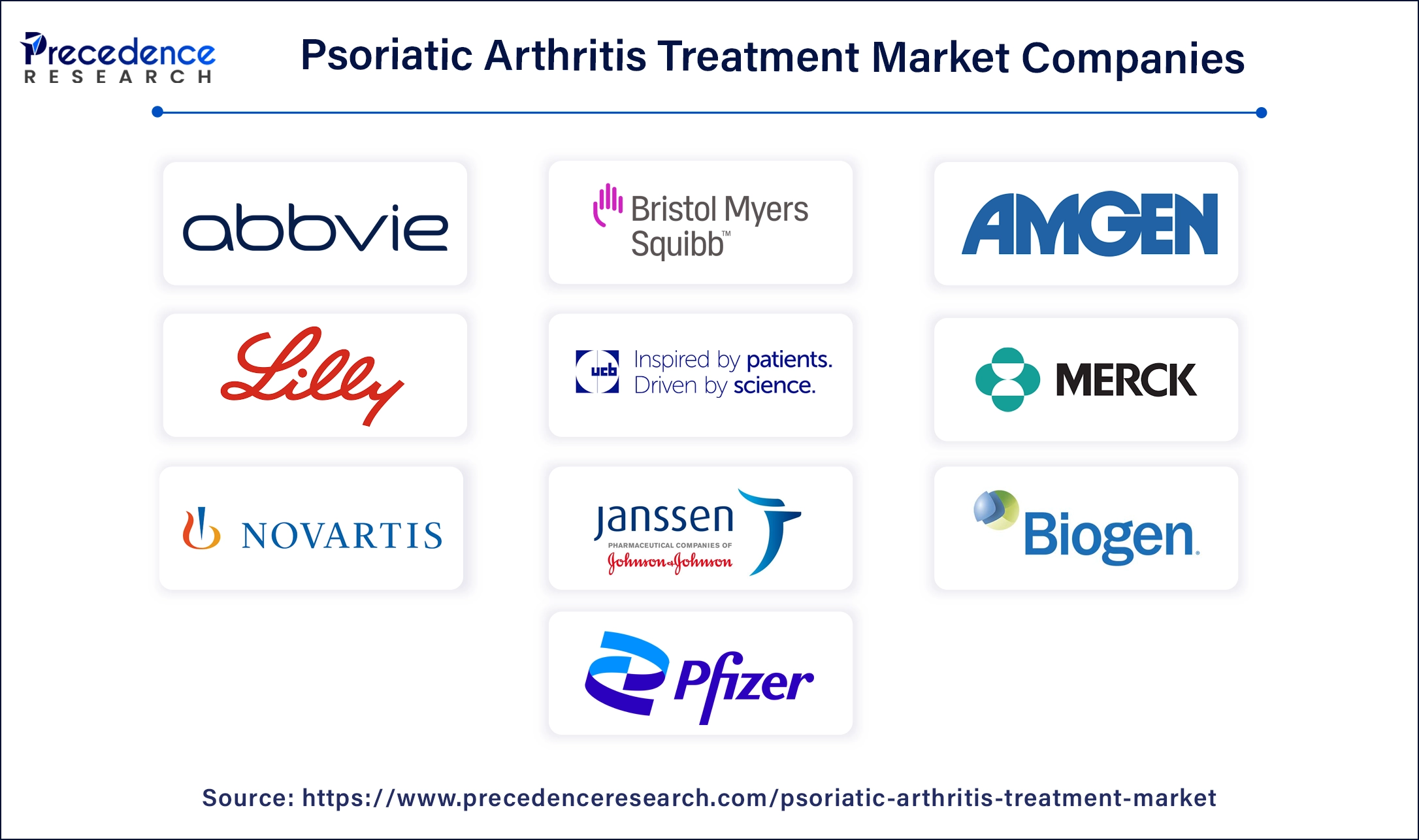June 2024
Psoriatic Arthritis Treatment Market (By Drug Class: Non-steroidal Anti-inflammatory Drugs (NSAIDs), Non-biologics Disease-modifying Anti-rheumatic Drugs (DMARDs), Biologics Disease-modifying Anti-rheumatic Drugs, Others; By Product Type: Prescriptions, OTC; By Route of Administration: Topical, Oral, Injectable) - Global Industry Analysis, Size, Share, Growth, Trends, Regional Outlook, and Forecast 2024-2034
The global psoriatic arthritis treatment market size was USD 11.30 billion in 2023, calculated at USD 12.18 billion in 2024 and is expected to reach around USD 25.89 billion by 2034, expanding at a CAGR of 7.83% from 2024 to 2034. The North America psoriatic arthritis treatment market size reached USD 4.75 billion in 2023. Rising the prevalence of psoriatic arthritis diseases can boost the psoriatic arthritis treatment market.

The U.S. psoriatic arthritis treatment market size was exhibited at USD 3.32 billion in 2023 and is projected to be worth around USD 7.76 billion by 2034, poised to grow at a CAGR of 8.02% from 2024 to 2034.

North America dominated the psoriatic arthritis treatment market in 2023. The psoriatic arthritis is relatively common in North America, especially in the United States. The need for efficient treatment choices rises as a result. The area's well-established healthcare system makes it easier for advanced therapies to be developed, approved, and distributed. Better patient care and access to healthcare facilities are also included.
Numerous well-known pharmaceutical firms that make significant investments in the investigation and creation of advanced psoriatic arthritis medicines are based in North America. As a result, the area has more access to advanced medicines. Particularly in the United States and Canada, extensive health insurance programs and reimbursement guidelines are in place, making it simpler for patients to pay for pricey psoriatic arthritis therapies and treatment.

Asia Pacific is expected to grow at the highest CAGR in the psoriatic arthritis treatment market during the forecast period. In the region, psoriatic arthritis is becoming more common due to a combination of causes, including changing lifestyles, greater awareness, and improved diagnostic tools. The area has several nations making significant investments to upgrade their healthcare systems. This covers the creation of better healthcare facilities and the availability of advanced therapies.
The economic expansion in nations like China, India, and Japan is driving up healthcare costs, making more individuals able to pay for advanced treatments for ailments like psoriatic arthritis. Psoriatic arthritis is becoming more widely known in the community and among medical professionals in the area. The need for efficient treatments has increased as a result of earlier diagnosis and treatment.
The psoriatic arthritis treatment market refers to treatment for individuals with psoriasis who could grow psoriatic arthritis (PsA), a kind of inflammatory arthritis. The goals of treatment are to manage symptoms, shield joints from harm, and enhance life. The market is fragmented with multiple small-scale and large-scale players, such as AbbVie Inc., Janssen Global Services, LLC (Johnson & Johnson), Novartis AG, Amgen Inc., Biogen Inc., Pfizer Inc., Eli Lilly and Company, UCB S.A., Bristol-Myers Squibb Company, Merck & Co. Inc.
| Report Coverage | Details |
| Market Size by 2034 | USD 25.89 Billion |
| Market Size in 2023 | USD 11.30 Billion |
| Market Size in 2024 | USD 12.18 Billion |
| Market Growth Rate from 2024 to 2034 | CAGR of 7.83% |
| Largest Market | North America |
| Base Year | 2023 |
| Forecast Period | 2024 to 2034 |
| Segments Covered | Drug Class, Product Type, Route of Administration, and Regions |
| Regions Covered | North America, Europe, Asia-Pacific, Latin America, and Middle East & Africa |
Increasing prevalence of psoriatic arthritis
The increasing prevalence of psoriatic arthritis can boost the psoriatic arthritis treatment market. Effective therapies are in more demand as PsA diagnoses increase. This promotes the discovery of novel treatments and boosts sales of currently available pharmaceuticals. Psoriatic arthritis sufferers are becoming more prevalent, which broadens the market and gives pharmaceutical businesses more consumers for their goods. As the frequency of a disease rises, the general public and medical experts usually have more knowledge about it. The demand for therapies may increase due to greater diagnosis and early action.
Side effects and adverse reactions of psoriatic arthritis treatment
The side effects and when severe adverse responses occur, patients and healthcare professionals may become concerned about patient safety adverse reactions of psoriatic arthritis treatment may slow down the psoriatic arthritis treatment market. The patients may stop taking their recommended medications due to severe adverse effects. Medication non-adherence can lead to inadequate illness management, which can impact treatment success rates overall and market expansion. Patients and healthcare professionals may become concerned about patient safety when severe adverse responses occur. This may lessen people's desire to start or continue with specific therapies, which might affect consumer demand.
Improved psoriatic arthritis treatment
The improved psoriatic arthritis treatment can be the opportunity to boost the psoriatic arthritis treatment market. The more advanced treatment alternatives can help patients live better lives with less joint degeneration and better symptom control. This may lead to a rise in the need for more recent and potent therapies. More patient adherence and satisfaction can result from treatments with greater efficacy, fewer side effects, and more flexible dosage schedules, which can propel market expansion.
The biologics segment dominated the psoriatic arthritis treatment market in 2023. Psoriatic arthritis (PsA) has demonstrated notable benefits from biological treatment, with biologics frequently surpassing conventional DMARDs in terms of symptom reduction, joint preservation, and patient quality of life. By targeting certain immune system components implicated in PsA inflammation, biologics are made to do just that. Compared to more widely acting therapies, this focused strategy may produce greater results and fewer adverse effects.
Biologic drugs have been increasingly popular and dominant in the market due to ongoing research and development that has produced novel agents that provide physicians and patients additional alternatives. Better long-term results in terms of disease progression and remission rates have been regularly demonstrated by clinical studies and real-world data with biologics.
The non-steroidal anti-inflammatory drugs (NSAIDs) segment is expected to grow at the highest CAGR in the psoriatic arthritis treatment market during forecast period. Globally, the number of instances of psoriatic arthritis is increasing, which is driving up demand for non-steroidal anti-inflammatory drugs (NSAIDs) and other effective symptomatic treatments. NSAIDs are frequently used because of how quickly they may lower pain and inflammation, giving psoriatic arthritis (PsA) sufferers instant relief. They are, therefore, a well-liked option for treating acute symptoms. The non-steroidal anti-inflammatory drugs (NSAIDs) are generally accessible to a wide range of patients, as they may be purchased over the counter or with a prescription.
The non-steroidal anti-inflammatory drugs (NSAIDs) are often less expensive than biologics and other cutting-edge medications, making them attractive to individuals who might not have insurance for more costly treatments. To control symptoms, non-steroidal anti-inflammatory drugs (NSAIDs) are commonly used in conjunction with other medicines such as biologics or DMARDs. This practice boosts non-steroidal anti-inflammatory drugs (NSAIDs) use overall and contributes to market growth.
The prescriptions segment dominated the psoriatic arthritis treatment market in 2023. The psoriatic arthritis can be effectively treated with prescription pharmaceuticals such as biologics, disease-modifying anti-rheumatic drugs (DMARDs), and targeted synthetic DMARDs. These therapies have the potential to greatly lessen symptoms and enhance patients' quality of life.
The complicated and long-lasting nature of psoriatic arthritis frequently necessitates the use of specific medications, which are usually only prescribed. In general, over-the-counter drugs are insufficient to adequately manage the illness. The pharmacists prefer to provide psoriatic arthritis drugs that have been clinically demonstrated to be beneficial. It is ensured that patients receive the most suitable therapies when healthcare experts are involved in the diagnostic and treatment process. Patients with psoriatic arthritis have greater access to prescription drugs since insurance plans frequently cover them.
The OTC segment is expected to grow at the highest CAGR in the psoriatic arthritis treatment market during the forecast period. Customers are becoming more knowledgeable about psoriatic arthritis and the availability of over-the-counter medications that can aid symptom management. This awareness is being fueled in part by enhanced information availability and education programs. Many patients prefer OTC drugs due to their accessibility and convenience.
With the help of these drugs, fewer symptoms can be managed on one's own without a prescription or regular medical appointments. More individuals are looking for less expensive alternatives to prescription drugs as healthcare expenses keep rising. OTC medications are a desirable alternative for treating milder symptoms because they are usually less costly and ss costly and don't require a visit to the doctor. The pharmaceutical firms are adding over the counter (OTC) items to their lineup, such as anti-inflammatory drugs, pain relievers, and topical psoriatic arthritis therapies.
The injectable segment dominated the psoriatic arthritis treatment market in 2023. The treatments that can be injected, especially biologics, are recognized for their superior effectiveness and quicker start of action than oral drugs. For patients and medical professionals seeking efficient symptom alleviation, this makes them the go-to option. Psoriatic arthritis has never been treated the same way thanks to the discovery and approval of biologic medications, which are often injected. By focusing on particular immune system components, these medications provide more efficient therapy alternatives. Despite the possibility of many injections, many patients choose injectable therapy because of their efficacy. Despite the discomfort of injections, patients are more inclined to stick to these treatment plans once they feel a noticeable improvement in their condition.
The oral segment is expected to grow at the highest CAGR in the psoriatic arthritis treatment market during the forecast period. The moment it comes to patient convenience and ease of use, oral drugs are often superior to injectables. They do away with the requirement for unpleasant injections that must be administered by medical specialists.
The effectiveness and safety profiles of oral medications for psoriatic arthritis have been enhanced by recent developments in oral medicines, such as the creation of small molecule inhibitors like phosphodiesterase 4 (PDE4) and Janus Kinase (JAK) inhibitors. Because pills are more convenient than injections, many patients choose oral drugs. This inclination may result in increased treatment regimen adherence. Better safety profiles are being added to newer oral drugs, making them a more appealing choice for consumers and medical professionals.

Segment Covered in the Report
By Drug Class
By Product Type
By Route of Administration
By Geography
For inquiries regarding discounts, bulk purchases, or customization requests, please contact us at sales@precedenceresearch.com
No cookie-cutter, only authentic analysis – take the 1st step to become a Precedence Research client
June 2024
January 2025
May 2024
February 2025